As a cat owner, I’m always looking for ways to provide my furry friend with the best care and nutrition. That’s why I started making homemade broth for cats. Not only is it a delicious treat, but it also has numerous health benefits. In this article, I’ll share with you a simple recipe for homemade cat broth that will nourish and delight your pet.
Homemade broth for cats is a nutrient-rich liquid made from chicken legs, water, and a few other simple ingredients. It’s packed with vitamins, minerals, and collagen, which can improve your cat’s digestion, immune function, and overall health. Plus, it’s easy to make, and your cat will love the taste!
Key Takeaways:
- Homemade broth for cats is a nutritious and tasty addition to their diet.
- It can improve digestion, immune function, and promote overall health.
- The recipe is simple and requires only a few ingredients.
- Start by introducing the broth gradually into your cat’s diet.
- Consult with your veterinarian before making any changes to your pet’s diet.
Benefits of Homemade Broth for Cats
Homemade broth for cats offers a range of benefits that can contribute to their overall health and well-being. This easy homemade cat broth recipe provides a nourishing and tasty addition to your cat’s diet. Here are some of the key advantages of including homemade broth in your cat’s meal plan:
- Promotes skin and coat health: The natural collagen and amino acids present in homemade broth can help improve your cat’s skin and coat, making it shinier and healthier-looking.
- Supports joint health: The cartilage and bone components in broth can provide essential nutrients for your cat’s joints, helping to maintain their mobility and reduce the risk of arthritis.
- Aids digestion: Homemade broth can be beneficial for cats with sensitive stomachs or digestive issues. It can help soothe their digestive system and improve overall gut health.
- Provides hydration: Cats often have a low thirst drive and may not drink enough water. Adding homemade broth to their diet can help increase their water intake, keeping them well-hydrated.
By incorporating homemade broth into your cat’s meals, you are not only enhancing their nutritional intake but also enticing their taste buds. It’s a win-win situation for both you and your feline friend!
Quote:
“Homemade cat broth is a nourishing and delicious way to provide your cat with essential nutrients and hydration. It’s a simple recipe that offers numerous benefits for your cat’s overall health and well-being. Give it a try, and your furry friend will thank you!”
Now that you understand the benefits of homemade broth for cats, let’s move on to the next section to learn about the essential ingredients and supplies you’ll need to make your own cat broth at home.
Ingredients and Supplies for Homemade Cat Broth
When making homemade broth for your cat, it’s important to gather the right ingredients and supplies. Here are the key components you’ll need:
- Chicken legs with skin and bone: Choose high-quality chicken legs that are safe for consumption by cats. The skin and bone will provide flavor and nutrients to the broth.
- Water: Use clean, filtered water to ensure the broth is pure and free from contaminants.
- Stock pot: A large stock pot will be used to cook the broth.
- Ice cube trays or mason jars: These containers will be used to store the homemade broth, allowing for easy portioning and convenience.
By having these ingredients and supplies ready, you’ll be fully prepared to make a delicious and nourishing broth for your furry friend.
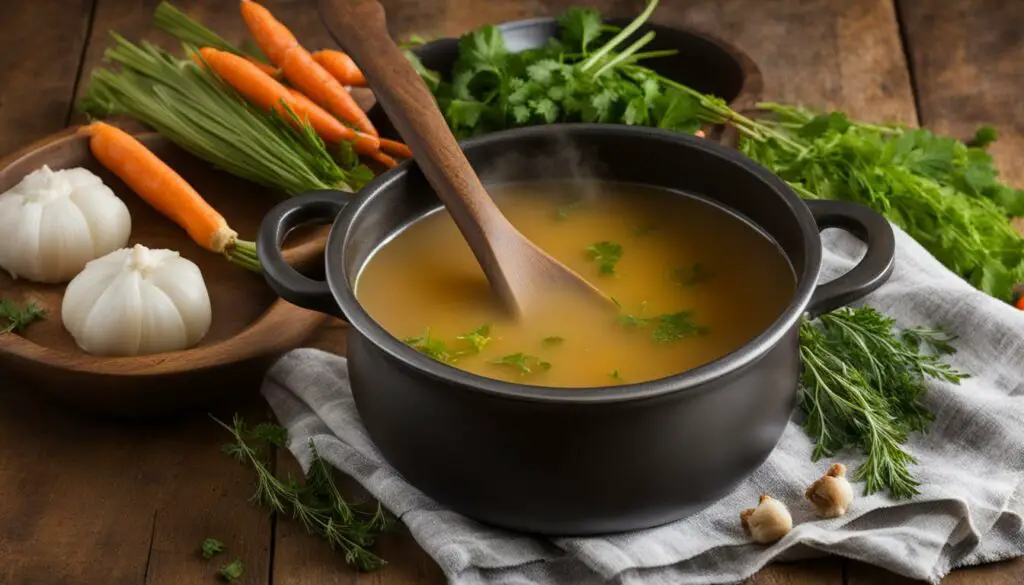
Cooking Instructions for Homemade Cat Broth
Creating homemade cat broth is a simple and rewarding process that will provide your feline friend with a nourishing and delicious treat. Follow these easy cooking instructions to make a delectable cat soup recipe that your furry companion will love.

Ingredients and Supplies:
- 2 chicken legs with skin and bone
- Water
- Stock pot
- Ice cube trays or mason jars for storage
Instructions:
- Place the chicken legs with skin and bone in a stock pot.
- Fill the pot with water, ensuring that the chicken is fully submerged.
- Bring the water to a boil over medium-high heat.
- Once boiling, reduce the heat and let the broth simmer for 90 minutes.
- After simmering, remove the pot from the heat and let the broth cool.
- Once cooled, strain the broth to remove any bones or debris.
- Store the homemade cat broth in ice cube trays or mason jars for easy portioning and storage.
It’s important to note that while this homemade cat broth is safe and beneficial for your feline companion, it should only be used as a supplement to their regular diet. Always consult with your veterinarian before introducing any new foods or recipes into your cat’s routine.
Feeding Instructions for Homemade Cat Broth
Feeding your cat homemade broth is a wonderful way to provide them with extra hydration and nutrients. However, it’s important to introduce the broth gradually into their diet to avoid any digestive upset. Here are some feeding instructions to follow:
Introducing Homemade Cat Broth
- For cats and small dogs: Start by adding 1 teaspoon of homemade broth to their regular food twice daily.
- For medium-sized dogs: Add ½ tablespoon of broth to their meals twice daily.
- For large dogs: Include 1 tablespoon of homemade broth in their food twice daily.
Remember to consult with your veterinarian before making any changes to your pet’s diet, especially if they have any specific health conditions or dietary restrictions.
Serving Suggestions
There are various ways to serve homemade cat broth to your furry friend:
- As a food topper: Drizzle a small amount of broth over their regular food to entice picky eaters and enhance the flavor.
- Mix with dry kibble: If your cat prefers dry food, you can mix the homemade broth with their kibble to add moisture and make it more appealing.
- Freeze in ice cube trays: Pour the broth into ice cube trays and freeze them. This allows for easy portioning and a refreshing treat during warmer months.
Remember to always let the homemade broth cool before serving it to your cat. You can store any leftover broth in the refrigerator for up to 7 days or in the freezer for up to 6 months for future use.
| Feeding Instructions | Cat Size | Broth Amount | Frequency |
|---|---|---|---|
| Cats and Small Dogs | Under 10 lbs (4.5 kg) | 1 teaspoon | Twice daily |
| 10-20 lbs (4.5-9 kg) | 2 teaspoons | Twice daily | |
| Medium-sized Dogs | 20-40 lbs (9-18 kg) | 1/2 tablespoon | Twice daily |
| 40-60 lbs (18-27 kg) | 1 tablespoon | Twice daily | |
| Large Dogs | 60-80 lbs (27-36 kg) | 1 1/2 tablespoons | Twice daily |
| 80+ lbs (36+ kg) | 2 tablespoons | Twice daily |
How to Serve Homemade Cat Broth
Homemade cat broth is a versatile and flavorful addition to your cat’s diet. There are several ways you can serve this nourishing broth to your feline friend. Here are some ideas:
1. Food Topper
Add a spoonful of homemade cat broth as a food topper to entice picky eaters. The delicious aroma and taste of the broth can make their meal more enticing and enjoyable. Simply drizzle the broth over their regular food and watch them lick their bowls clean.
2. Moisture Booster for Dry Kibble
If your cat prefers dry kibble over wet food, you can enhance their meal by adding homemade broth. Drizzle a small amount of broth over the kibble to add moisture and flavor. This can make the kibble more palatable and encourage your cat to stay hydrated.
3. Frozen Treat
If you want to provide your cat with a refreshing treat on a hot day, you can freeze the homemade broth in ice cube trays. Once frozen, these broth cubes can be served as a delicious and hydrating snack. Your cat will love licking and crunching on these icy delights.
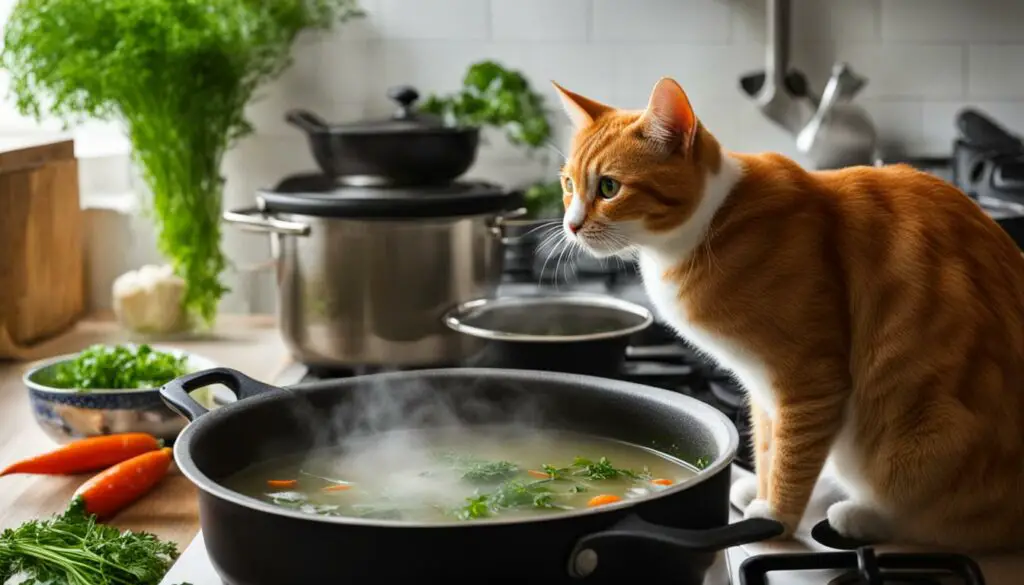
Remember to always let the broth cool to room temperature before serving it to your cat. Hot broth can cause burns and discomfort. Additionally, it’s important to monitor your cat while they enjoy the broth to ensure they are eating safely and not choking on any bones or solid pieces.
By serving homemade cat broth in these different ways, you can make mealtime more enjoyable and nourishing for your feline companion. Experiment with different serving methods to find what your cat enjoys the most. Remember, every cat is unique, so it may take some trial and error to discover their preferences.
How to Store Homemade Cat Broth
Properly storing homemade cat broth is essential to maintain its freshness and ensure its safety for your feline friend. Follow these steps to store your homemade cat broth:
- Allow the broth to cool to room temperature after cooking.
- Refrigerate the broth for a few hours, until any fat on the surface solidifies.
- Gently remove the solidified fat from the surface of the broth.
- Divide the broth into desired portion sizes.
- Store the broth in airtight containers, such as ice cube trays or mason jars, to prevent freezer burn and maintain freshness.
- Label the containers with the date of preparation to keep track of their shelf life.
- Place the containers in the freezer until ready to use.
Table: Storage Guidelines for Homemade Cat Broth
| Storage Method | Duration |
|---|---|
| Refrigerator | Up to 7 days |
| Freezer (in ice cube trays) | Up to 6 months |
| Freezer (in mason jars) | Up to 6 months |
By following these storage guidelines, you can ensure that your homemade cat broth remains fresh and safe for your furry friend to enjoy. Always thaw and warm the frozen broth before serving it to your cat, and discard any broth that has been stored for longer than the recommended durations.
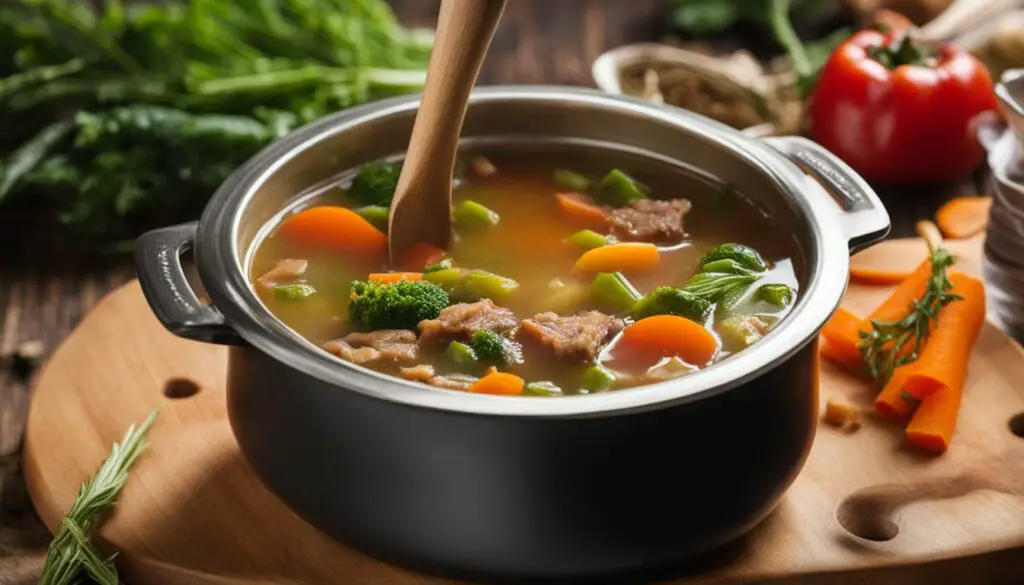
Additional Tips for Storing Homemade Cat Broth:
- Consider freezing the broth in ice cube trays for easy portioning. Each cube can be thawed and served individually.
- If using mason jars for storage, make sure to leave some headspace at the top to allow for expansion as the broth freezes.
- Label the containers with the contents and date to ensure you use the oldest broth first. This will help you maintain a fresh supply of homemade cat broth.
Benefits of Bone Broth for Cats
When it comes to nourishing your feline friend, homemade bone broth offers numerous benefits that can support their overall health and well-being. This nourishing liquid is packed with essential nutrients and vitamins that can provide a range of advantages for your cat’s body. Let’s take a closer look at some of the key benefits of including bone broth in their diet:
Improved Hydration and Digestion
Bone broth is an excellent source of hydration for cats, especially those who may not drink enough water on their own. The flavorful broth can entice even the pickiest eaters to consume more liquids, helping to prevent dehydration. Additionally, the collagen in bone broth can support their digestive system by promoting the growth of beneficial gut bacteria and soothing digestive issues.
Joint Health and Mobility
As cats age, they may experience joint discomfort and stiffness. The natural compounds found in bone broth, such as glucosamine and chondroitin, can help reduce inflammation and support joint health. Regular consumption of bone broth may improve your cat’s mobility, making it easier for them to move around comfortably.
Healthy Skin and Coat
The collagen and amino acids in bone broth can contribute to healthier skin and a lustrous coat for your cat. These nutrients help strengthen the skin’s barrier, promote hair growth, and reduce dryness and itching. Incorporating bone broth into their diet can lead to a noticeable improvement in the condition of their skin and coat over time.
| Benefit | Description |
|---|---|
| Improved Hydration and Digestion | Bone broth provides hydration and supports a healthy gut. |
| Joint Health and Mobility | Collagen in bone broth reduces inflammation and improves joint function. |
| Healthy Skin and Coat | The nutrients in bone broth promote a shiny coat and resilient skin. |
By incorporating homemade bone broth into your cat’s diet, you can provide them with a nourishing and flavorful addition that offers a range of health benefits. Consider introducing bone broth as a regular part of their mealtime routine and consult with your veterinarian for personalized advice.
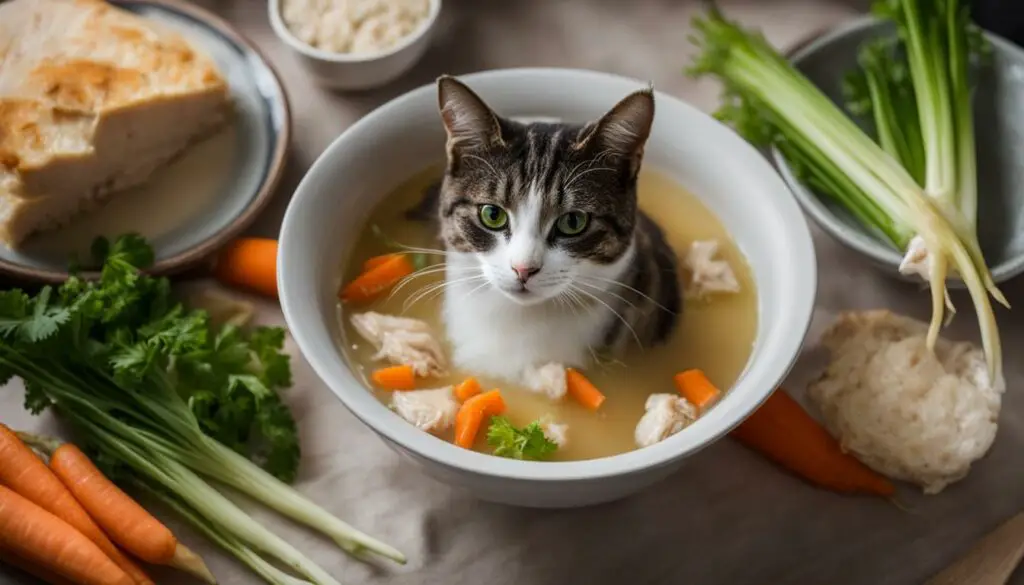
Dangers to Avoid in Homemade Cat Broth
When making homemade cat broth, it is important to be aware of certain ingredients that can be harmful to cats. To ensure the safety and well-being of your feline friend, avoid including onions, garlic, or spices in the broth. These ingredients can be toxic and may cause digestive issues or even damage to your cat’s red blood cells.
Additionally, it is crucial to remove any cooked bones or solid bone splinters from the broth before serving it to your cat. Cooked bones can easily splinter and pose a choking hazard or cause internal injuries. Always make sure to strain the broth thoroughly and eliminate any potential bone fragments.
“Feeding cats homemade broth can be a wonderful way to provide them with hydration and additional nutrients. However, it’s important to be mindful of the ingredients used and avoid potential dangers,” says Dr. Sarah Thompson, a veterinarian specializing in feline health.
By following these precautions and making homemade cat broth with safe and cat-friendly ingredients, you can ensure that your furry companion enjoys a nourishing and delicious treat without any risks to their health.
| Dangers to Avoid in Homemade Cat Broth |
|---|
| Onions, garlic, and spices |
| Cooked bones or bone splinters |
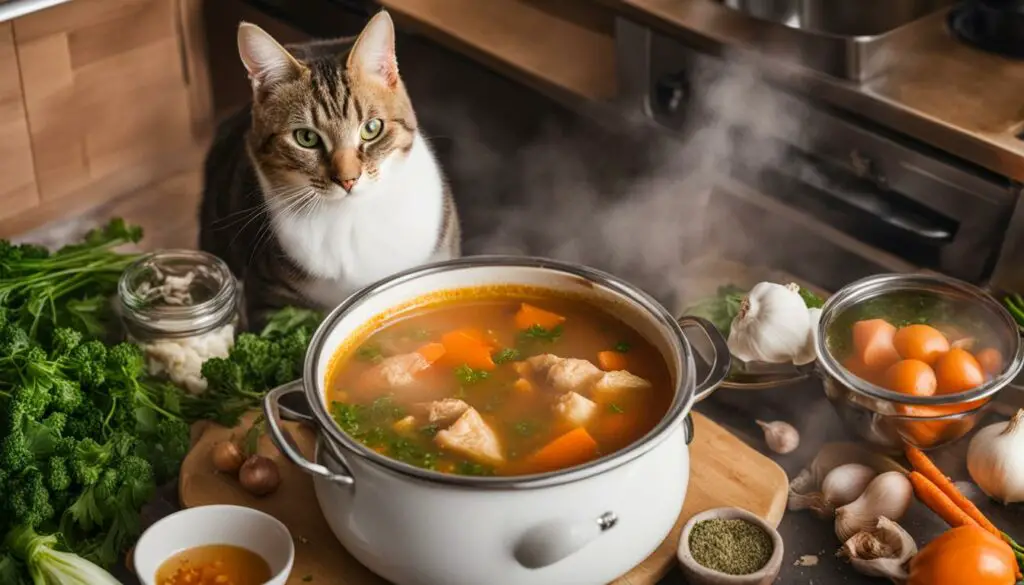
- Avoid using onions, garlic, or spices in homemade cat broth.
- Remove any cooked bones or bone splinters from the broth before serving it to your cat.
- Consult with a veterinarian for personalized advice on homemade cat broth.
Recipe for Homemade Chicken Stock for Cats
Making homemade chicken stock for cats is a simple and nutritious process. This recipe uses chicken or turkey bones to create a flavorful broth that your feline friend will love. Here’s how to make it:
Ingredients:
- Chicken or turkey bones
- Carrots
- Celery
- Water
Instructions:
- Place the bones in a pot.
- Add carrots and celery for added flavor and nutrients.
- Cover the bones and vegetables with water.
- Simmer the stock on low heat for about 6 hours.
- Strain the stock to remove any bones, carrots, and celery.
- Allow the stock to cool before serving or freezing in molds.
Homemade chicken stock provides hydration and various health benefits for cats. It can be served on its own or used as a flavorful addition to your cat’s meals. Remember to consult with your veterinarian before introducing any new foods to your cat’s diet.
| Benefits of Homemade Chicken Stock for Cats | Store-Bought Broth |
|---|---|
| Hydrates cats and encourages water consumption | Provides a convenient option for busy pet owners |
| Contains natural nutrients and collagen for skin and coat health | Offers a variety of flavors and options for picky eaters |
| Can be customized to suit your cat’s dietary needs | May contain additives or ingredients that are not suitable for all cats |

“Homemade chicken stock is a nourishing and delicious addition to your cat’s diet. By making it yourself, you can ensure that your cat is getting high-quality ingredients without any additives or harmful substances. Plus, the process is simple and cost-effective. Give it a try and see how your cat enjoys this homemade treat!”
Benefits of Store-Bought Cat Broth
Store-bought cat broth offers a convenient option for cat owners who do not have the time or resources to make homemade broth. These broths are specifically formulated for cats, ensuring that they meet their nutritional needs. Here are some benefits of choosing store-bought cat broth:
Convenience and Variety
Store-bought cat broth comes in a ready-to-use form, eliminating the need for preparation. You can simply open the container and pour the broth into your cat’s bowl. Additionally, these broths often come in a variety of flavors, allowing you to introduce different options to your cat’s diet and cater to their preferences.
Added Nutrients
Many store-bought cat broths are fortified with additional nutrients to enhance their nutritional profile. These broths may contain added vitamins, minerals, and other supplements beneficial for your cat’s overall health. By incorporating store-bought broth into your cat’s diet, you can provide them with a diverse range of nutrients.
Hydration and Palatability
Store-bought cat broth can be an effective way to increase your cat’s water intake and keep them hydrated. Cats may be more enticed to consume broth due to its appealing taste and aroma, making it an excellent option for picky eaters. The moisture content in the broth can contribute to your cat’s daily hydration needs.
While store-bought cat broth offers convenience and additional benefits, it is essential to ensure that you choose a reliable brand that uses high-quality ingredients. Always check the label and avoid any broths that contain harmful additives, preservatives, or artificial flavors. Consulting with your veterinarian can help you select the best store-bought cat broth option for your furry friend.
Homemade vs. Store-Bought Cat Broth: What to Consider
When it comes to nourishing your feline friend with a delicious broth, you have two options: homemade or store-bought. Both options have their benefits and drawbacks, so it’s important to consider a few factors before making a decision.
When preparing homemade broth for your cat, you have complete control over the ingredients and can ensure their quality. You can use high-quality chicken legs, water, and other cat-safe ingredients to create a nourishing and flavorful broth. However, making homemade broth requires time and effort in the kitchen. If you’re short on time or prefer convenience, store-bought broths are a viable option.
Store-bought cat broths offer convenience and are readily available in pet stores and online. They are specifically formulated for cats, providing hydration and additional nutrients. However, it’s important to carefully read the labels and select broths that do not contain any harmful ingredients or additives. Some store-bought broths may have added fillers or flavors that may not be suitable for your cat’s dietary needs.
In conclusion, the decision between homemade and store-bought cat broth depends on your preferences, available time, and your cat’s specific dietary requirements. Homemade broth allows for greater control over ingredients, while store-bought broths offer convenience. Whichever option you choose, always prioritize your cat’s health and consult with your veterinarian for personalized advice.
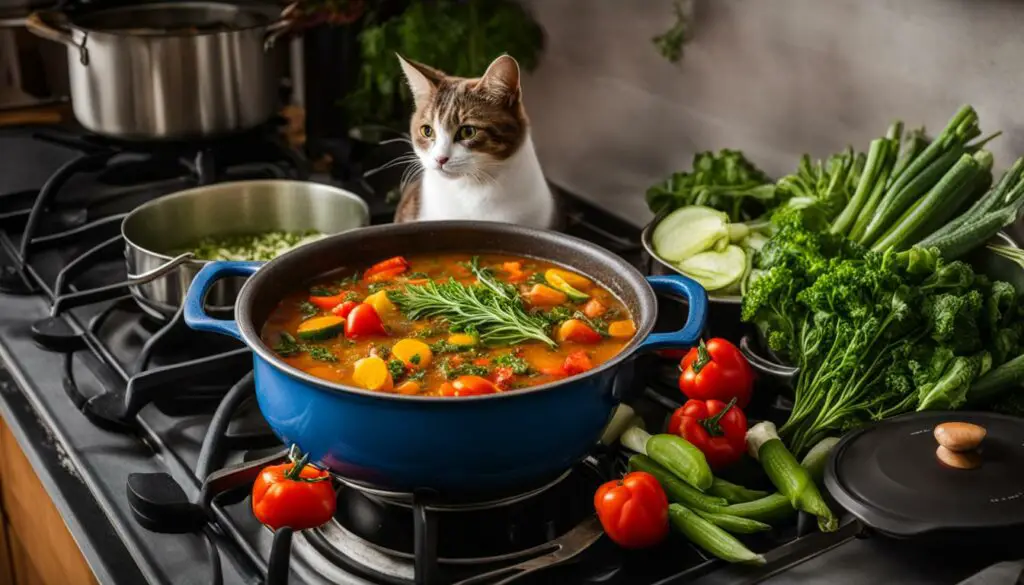
Comparison Table: Homemade vs. Store-Bought Cat Broth
| Homemade Cat Broth | Store-Bought Cat Broth | |
|---|---|---|
| Ingredients | Control over quality | Varies; read labels carefully |
| Preparation Time | Time-consuming | Instant |
| Nutrient Content | Can be tailored to your cat’s needs | Formulated for cats |
| Convenience | Requires time and effort | Readily available |
| Control over Ingredients | Complete control | Varies; read labels carefully |
| Cost | Ingredients and cooking equipment costs | Varies |
Other Cat Broth Options
If you’re looking to add variety to your cat’s diet, there are other cat-friendly broth options available besides chicken broth. These options can provide different flavors and textures to keep your cat interested and satisfied. Here are a few alternative broths to consider:
Tuna Broth
Tuna broth is a popular choice among cats. Made from simmering tuna in water, this broth is packed with fishy flavors that many cats find irresistible. It can be used as a food topper or served on its own as a tasty treat. Just make sure to use tuna in water, not oil, to avoid unnecessary fats and calories.
Beef Broth
If your cat enjoys the rich taste of beef, beef broth can be a great option. Made by simmering beef bones and meat in water, beef broth provides a savory flavor that cats love. It can be served as a standalone broth or used as a base for other homemade cat recipes.
Vegetable Broth
For cats that prefer a vegetarian option, vegetable broth can be a good choice. Made by simmering a variety of vegetables in water, vegetable broth is light and refreshing. It can be a good option for cats with dietary restrictions or those who enjoy a lighter taste.
| Broth | Taste | Preparation |
|---|---|---|
| Tuna Broth | Fishy | Simmer tuna in water |
| Beef Broth | Savory | Simmer beef bones and meat in water |
| Vegetable Broth | Light and refreshing | Simmer various vegetables in water |
When choosing alternative cat broths, always prioritize high-quality ingredients and avoid any harmful additives or seasonings. It’s also important to consult with your veterinarian before introducing new foods to your cat’s diet, especially if they have any specific dietary needs or health conditions.

Hydration Importance for Cats
Proper hydration is essential for maintaining your cat’s overall health. Cats have a low thirst drive and may not consume enough water on their own. This is where homemade broth for cats can play a significant role. By incorporating nourishing broth into their diet, you can help increase their water intake and prevent dehydration-related health issues.
Cats are prone to urinary tract problems, and dehydration can exacerbate these issues. Adequate hydration helps to flush out toxins from their bodies and promotes healthy kidney function. By providing a delicious and nourishing homemade broth, you can encourage your cat to consume more fluids and support their urinary tract health.
In addition to preventing dehydration, homemade broth offers other benefits for cats. It provides additional nutrients, such as vitamins, minerals, and collagen, which can improve their overall well-being. The nourishing properties of the broth can also support joint health, promote healthy skin and coat, and aid in digestion.
Introducing homemade broth into your cat’s diet is simple. You can serve it as a standalone drink or incorporate it into their meals as a tasty food topper. By doing so, you are not only improving their hydration but also enticing even the pickiest eaters. Remember to consult with your veterinarian for personalized advice on incorporating homemade broth into your cat’s diet.
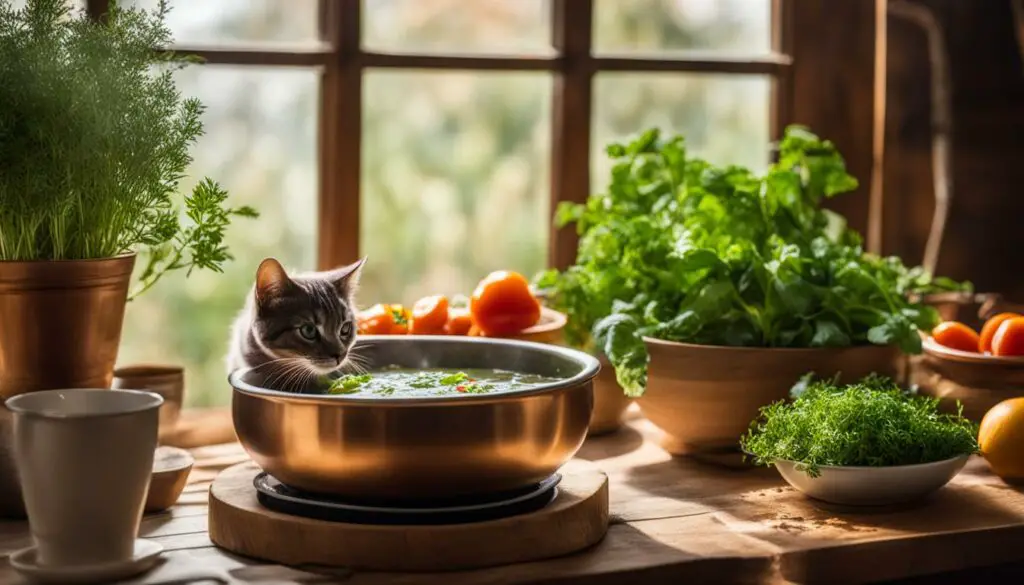
Now, let’s take a closer look at the benefits of homemade broth for cats and how to make it yourself.
Conclusion
In conclusion, homemade broth for cats is a delicious and nutritious addition to their diet. Whether you choose to make your own broth or opt for store-bought options, providing your cat with a homemade cat broth can offer several health benefits. By including this nourishing broth, you can improve your cat’s hydration and promote their overall well-being.
Homemade cat broth is packed with vitamins, minerals, and collagen, which can benefit your cat’s digestion, immune function, skin, coat, and joints. It is an excellent way to entice picky eaters and add extra moisture to your cat’s diet. Plus, it’s easy to make with simple ingredients such as chicken legs and water.
If you prefer the convenience of store-bought options, make sure to choose pet-safe broths that do not contain any harmful additives or ingredients. Always consult with your veterinarian before making any changes to your cat’s diet or introducing new foods.
Remember, maintaining proper hydration is essential for your cat’s health. Homemade or store-bought broths can help increase their water intake and prevent dehydration-related issues. So, why not treat your furry friend to a delicious bowl of homemade cat broth or explore the different cat-friendly broth options available on the market? Your cat will love it!
FAQ
What are the benefits of homemade broth for cats?
Homemade broth for cats can improve skin and coat health, promote joint health, support liver and lung health, and improve gut health.
What are the ingredients and supplies needed for homemade cat broth?
To make homemade cat broth, you will need chicken legs with skin and bone, water, a stock pot, and ice cube trays or mason jars for storing the broth.
How do I cook homemade cat broth?
Place the chicken legs with skin and bone in a stock pot and fill it with water. Bring the water to a boil and let it simmer for 90 minutes.
How should I feed homemade cat broth to my cat?
Start by introducing the homemade broth slowly into your cat’s diet. For cats and small dogs, add 1 teaspoon of broth to their food twice daily.
How can I serve homemade cat broth?
Homemade cat broth can be served as a food topper or drizzled over your cat’s dry kibble to add moisture. It is important to let the broth cool before serving it to your cat.
How do I store homemade cat broth?
After making homemade cat broth, let it cool to room temperature and then chill it in the refrigerator for a few hours. Once any fat on the surface has solidified, remove it and divide the broth into desired portion sizes.
What are the benefits of bone broth for cats?
Bone broth is a nutritious supplement for cats. It provides hydration, improves skin and coat health, promotes joint health, supports liver and lung health, and improves gut health.
What dangers should I avoid in homemade cat broth?
When making homemade cat broth, it is important to avoid ingredients that can be toxic to cats, such as onions, garlic, or spices. Additionally, remove any cooked bones or bone splinters from the broth before serving it to your cat.
How do I make homemade chicken stock for cats?
If you prefer to use chicken or turkey bones for making homemade cat broth, you can place the bones in a pot with carrot and celery, cover them with water, and simmer the stock for about 6 hours on low heat.
What are the benefits of store-bought cat broth?
Store-bought cat broth offers convenience and can provide hydration and additional nutrients for your cat. Look for pet-safe broths that do not contain any harmful ingredients or additives.
What should I consider when choosing between homemade and store-bought cat broth?
Consider the pros and cons of homemade and store-bought cat broth before making a decision. Homemade broth allows you to control the ingredients, but it requires time and effort. Store-bought broths offer convenience but may contain additives or ingredients that are not suitable for cats.
Are there other cat broth options available?
Yes, there are other cat-friendly broth options available on the market. These broths come in different flavors and can provide variety in your cat’s diet. Look for broths made with high-quality ingredients and consult with your veterinarian before introducing new foods to your cat.
Why is hydration important for cats?
Maintaining proper hydration is crucial for cats’ overall health. Cats have a low thirst drive and may not consume enough water on their own. Including homemade or store-bought broth in their diet can help increase their water intake and prevent dehydration-related health issues.








